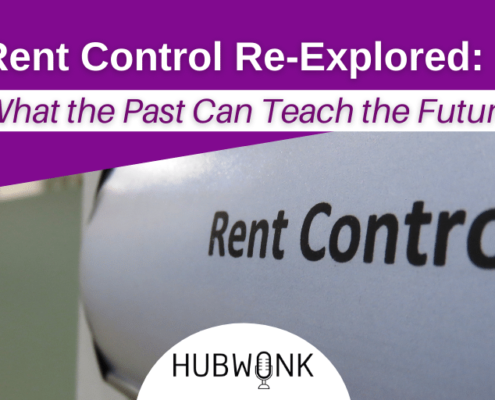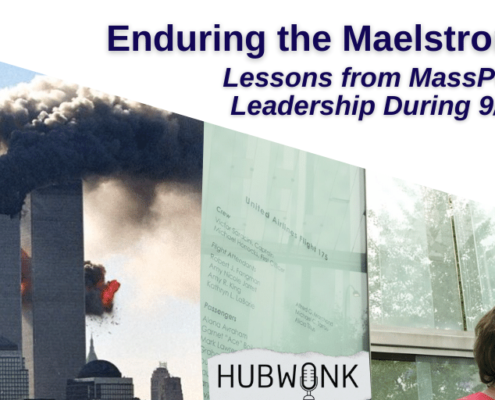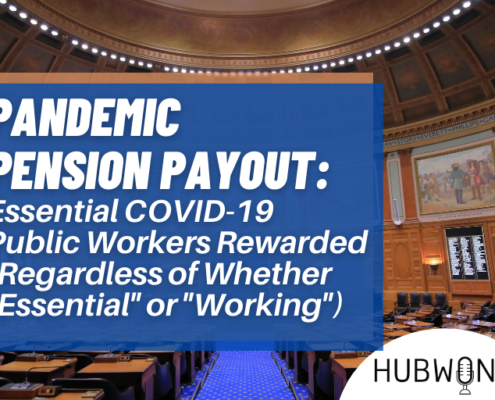Successful Aging Support: Reimagining Effective and Affordable Long-Term Care Solutions
/in Featured, Healthcare, Podcast Hubwonk /by Editorial StaffHubwonk host Joe Selvaggi talks with Brookings Institution Senior Fellow and healthcare policy expert Stuart Butler about the challenge of building long-term care systems and institutions that will support Americans as they age, without depleting assets and bankrupting the social safety net.
Guest:
 Stuart Butler is a senior fellow in Economic Studies at The Brookings Institution. Prior to joining Brookings, Butler spent 35 years at The Heritage Foundation as director of the Center for Policy Innovation and earlier as Vice President for Domestic and Economic Policy Studies. He is also a visiting fellow at the Convergence Center for Policy Resolution. Butler is a member of the editorial board of Health Affairs and the board of Mary’s Center, a group of Washington, D.C.-area community health centers. He also serves on several advisory councils, including for the Peterson Center on Healthcare, the National Coalition for Cancer Survivorship, and the March of Dimes. He served as a member of the Advisory Group for the Culture of Health Program and as member of the Board on Health Care Services of the National Academy of Medicine. He also served on the panel of health advisers for the Congressional Budget Office. For over 10 years he was an adjunct professor at Georgetown University’s McCourt School of Public Policy and in 2002 he was an Institute of Politics Fellow at Harvard University. Butler has played a prominent role in the debate over health care equity and reform, focusing on social determinants of health and the use of market approaches and state innovation. He has also researched and written on a wide range of other issues, including budget process reform, the future of higher education, economic mobility, and federal entitlement reform.
Stuart Butler is a senior fellow in Economic Studies at The Brookings Institution. Prior to joining Brookings, Butler spent 35 years at The Heritage Foundation as director of the Center for Policy Innovation and earlier as Vice President for Domestic and Economic Policy Studies. He is also a visiting fellow at the Convergence Center for Policy Resolution. Butler is a member of the editorial board of Health Affairs and the board of Mary’s Center, a group of Washington, D.C.-area community health centers. He also serves on several advisory councils, including for the Peterson Center on Healthcare, the National Coalition for Cancer Survivorship, and the March of Dimes. He served as a member of the Advisory Group for the Culture of Health Program and as member of the Board on Health Care Services of the National Academy of Medicine. He also served on the panel of health advisers for the Congressional Budget Office. For over 10 years he was an adjunct professor at Georgetown University’s McCourt School of Public Policy and in 2002 he was an Institute of Politics Fellow at Harvard University. Butler has played a prominent role in the debate over health care equity and reform, focusing on social determinants of health and the use of market approaches and state innovation. He has also researched and written on a wide range of other issues, including budget process reform, the future of higher education, economic mobility, and federal entitlement reform.
WATCH:
Get new episodes of Hubwonk in your inbox!
Read a Transcript of This Episode
Please excuse typos.
Joe Selvaggi:
This is Hubwonk, I’m Joe Selvaggi.
Joe Selvaggi:
Welcome to Hubwonk, a podcast of Pioneer Institute, a think tank in Boston. Modern medicine has offered Americans a longer, healthier life, but even those who age, most success will need to deal with a diminishment of capacity and the eventual need for support with transportation, meals, errands, and assistance at home. This need for long term care, as it is known is becoming an issue of national concern, going to the so-called baby boom generation entering their seventh decade and the growing cost for sustaining private long term care options. Over many years of aging policymakers and individuals themselves agree that long term care is best delivered in one’s own home and community, but institutions that support that delivery have been slow to emerge and leave the vast majority of middle class individuals with the risk of an eventually ending up in a public long term facility after their assets are depleted.
Joe Selvaggi:
How can we reorient our long term care support institutions in a way that both address Americans longer healthier lives and do it in a way that is affordable for individuals and will not strain our social welfare resources, I guest today, Stuart Butler senior fellow at Brookings institution, Mr. Butler has played a prominent role in the debate over healthcare equity and reform, focusing on social determinants of health and the use of market approaches and state innovation. He’s advised legislators in the US Congress and Mitt Romney while he’s served as Massachusetts governor, Mr. Butler has written extensively on the challenges of long term care in America and with a team of ideologically diverse experts, developed policy recommendations for cultivating institutions and structures to support the long term care of all of us. As we age, when I return, I’ll be joined by Brookings institution, senior fellow Stuart Butler. Okay. We’re back. This is Hubwonk I’m Joe Selvaggi and I’m pleased to be joined by senior fellow at Brookings institution, Stuart Butler. Welcome to Hubwonk, Stuart
Stuart Butler:
A pleasure. Thank you.
Joe Selvaggi:
All right. Before we talk about today’s topic, which is long term care I’d like our listeners to know something about your impressive background in healthcare reform. In fact, healthcare reform right here in Massachusetts you’ve of course advised members of Congress, but you’ve also were an advisor to our former governor Romney here in Massachusetts. You helped develop healthcare reforms in Massachusetts that have since been labeled Romney care or precursor even to the, a or Obamacare. Where did your passion for healthcare policy begin?
Stuart Butler:
Oh, really. I think from the very first time I came to the United States which was in 1979. And you know, I, some of the first things I did was actually write about why America should not adopt the system that I lived under the sort of socialist national health system. And, and, but as I spent more time here, I got more and more kind of involved in understanding the, the healthcare system itself here and particularly the employment based system and the pros and cons very many cons of that, and that kind of drew me into it. And I, and I really find it as an issue healthcare quite fascinating because it’s, it’s an issue which you have to approach on multiple levels. I mean, there are a lot of moral questions, you know, who should we care for and what is private responsibility?
Stuart Butler:
What is public responsibility? It’s technically a difficult and interesting issue, you know, it’s this blend of markets and public goods and so forth. So I just got sort of sucked into it if you like. And I’m more recently, I’ve been very involved in looking at some of the dimensions that affect care, that and affect health, I should say that are not sort of medical in nature. So housing, transportation, nutrition, what we call the social determinants of health and, and the need to have collaboration across sectors to enable people to be healthy for most of their life. And I, and I find that’s really a very, very fascinating because it gets you very much into sort of civil society questions and, and so on. So it’s, it’s an issue that just drew me in throughout my career.
Joe Selvaggi:
Wonderful. Well, you you revealed your your initial preference or your suspicion with let’s say public run healthcare systems, and mentioned in your intro there. You, you want to understand how markets and private and public dynamics work you’re now at Brookings institution. I think you’re the first of my guests from Brookings. But you are someone who loves to try to harness the power of markets to solve many of our public policy challenges. How did you find your way to Brookings?
Stuart Butler:
I’m sorry I’m the first from Brookings. I encourage you to invite some others in the future, because there’s a wide range of people actually at Brookings, I must say most of my friends are more on the liberal side than on the conservative side. Well, I was at the Heritage Foundation as I think, you know, for 35 years actually, when I firstencountered Pioneer Institute is when I first encountered Charlie Baker, your governor. I think when he was in the think tank world and I was very focused on looking at markets in that way, as you said to solve problems. And I still strongly believe that. I think there are really two reasons why I began to look at other approaches or blending other approaches into markets.
Stuart Butler:
One is the challenge of dealing with people who are low income. Who’ve got you know, really a lot of complicated backgrounds and so on. And also, as I said, the beginning there’s, there is a notion, I think that healthcare in America is something that as a society, we need to somehow make sure people have an adequate level. And I think that’s just, that’s just a description of how people think in America. That’s not true in a lot of other countries. So I think that challenge was then in addition, I think being at, at heritage for that long, I, I started beginning to think that I wanted to look at issues, which really were not so much front and center in the legislative area. Heritage is very focused on, on legislation on capital hill. That’s really why it was started Brooks on the other hand not only does that, but also really fosters work in a whole range of areas which have a very long kinda shelf life, if you like really looking at more local state issues and so on. So I was kind of drawn to move away from an organization that was focused on capital and legislation, so on and, and looking much more at an organization that had a wide range of views and also you know, allowed me to explore some of the areas, the dimensions of healthcare that it wasn’t too easy for me to do before.
Joe Selvaggi:
Wonderful well you’ve encouraged me to take a second look at Brooking. Thank so let’s, let’s get back. Let’s get right to our conversation about long term care. Let’s, let’s start at the beginning. You studied this extensively, is it O over a long arc of a, a, a very wonderful career? What is long term care?
Stuart Butler:
What I mean by long term care is really caring for people with a chronic condition over a long period of time. A chronic condition could mean just getting old and getting frailer. It could also mean somebody with a disability, but it’s the idea of dealing with a multiple needs of somebody that has a long kind of chronic condition. So when we see of long term care, as opposed to say healthcare, we’re not so much thinking of applying remedies and a lot of intensive clinical care and like that we’re really looking much more at, at the needs of people in their daily lives and, and how they can kind of live with a condition or age becoming more frail. So it focuses a lot more on providing sort of just the basic daily needs of people that kind of care, social care. If you like, it’s, that’s actually what it’s called in the UK, for example. So it, that’s the difference. The, and, and we’re really mainly talking about older people who are not able to take care of themselves any longer, probably have some medical condition, maybe cognitive decline. That’s a population which is growing and is a very turns out to be a very costly part of the population to serve
Joe Selvaggi:
Now is this so you made a very clear distinction. This is not healthcare, but rather all the attending needs of someone who is getting
Stuart Butler:
Overlaps, obviously with healthcare. I mean, people who in a long term care facility will often need he, but the point is that there’s their living situation, their around the clock needs are much more just basic needs of daily living, feeding, bathing you know, these kinds of issues.
Joe Selvaggi:
Now we don’t need to be a demographer to know that we are, we have an aging population, the baby will boomers are, are crossing the threshold, I think 10,000 baby boomers retire every day. Is that demographic shift in making this challenge even more acute?
Stuart Butler:
Absolutely. You know, and, and in a sensory eviction of our own success in this, because if you look at the, at the typical pattern of people, you know, when I was born in the 1940s and fifties and right through maybe the seventies people would have a reasonably healthy life they’d be in the workforce and so on to their sixties, or maybe early seventies. And then they would succumb to some disease fairly quickly. It could be a heart condition cancer or whatever what’s happened of in the last several decades is that we’ve managed to take care of those issues. We’ve managed to put off the time in which people die. So now we have a population there for a lengthy period, maybe two or three decades in some cases are not able to function at a hundred percent. They’re in decline and they need increasing needs. They need increasing care and that’s what we are seeing in the future. So it’s the fact, it’s actually the paradox of our success in healthcare has actually made our need for long term care, much greater.
Joe Selvaggi:
Well, I guess that’s good news in there somewhere, that’s say, okay, now, now where is long term care provided at this time?
Stuart Butler:
Well, really, actually most long term care is provided by family and friends in one’s home. I mean, most people age in their own home, they do get care, but then when you look at more institutional care, if they’re not able to do that, they don’t have that kind of support. We see the growth and there’s a big expansion of so-called assisted living. That means people living in an apartment with a set of services provided in that facility in some way, that’s typically for people who are still, you know, in, in, in reasonable shape, they do need help. They do need assistance. They do need maybe so much come in and, and provide some sort of basic services and look after their medication and things like that, but they can function beyond that. We think of, we, we think of institutions, which, which we call nursing homes in terms of people where they really need a much more intense level of care. They may be in cognitive decline. They may have Alzheimer’s they need a lot more assistance and that’s really expensive. I mean, the average cost of a shared room in a nursing home today is almost a hundred thousand dollars a year. So just think if somebody has to spend 10 years in a nursing home that’s approximately a million dollars.
Joe Selvaggi:
So
Stuart Butler:
That’s why we have a problem.
Joe Selvaggi:
That’s quite a, a lot. You you’ve framed it in a very large range, obviously or not. Obviously if we use family members to support us that’s presumably free, not, not free time, but we don’t pay those caregivers, but in a nursing home, we do. How do we now as a society pay for, let’s say in your case, the most expensive scenario a where one is has Alzheimer’s sure.
Stuart Butler:
Well, in the first instance, people pay out of pocket people who are middle class who are not eligible for Medicaid for, for the poor pay out of their own pocket. And, and the result of that is of course, that in many instances, people are, they thought they were going to have enough to live on in their retirement and they don’t. They run out of money when they run out of money, they then become by definition eligible for public support through the Medicaid program, which is a shared public, a shared state and federal program. So it can be very, it is very expensive. It’s an increasing share of Medicaid, and it’s a heavy burden on the state, as well as the federal government. And because of the shared nature of the Medicaid program.
Joe Selvaggi:
Now, now we’ve shared, you know, exposed our intuition that prefers a private solution. Why can’t in this situation, since we all know we’re all, hopefully gonna live a long age, why doesn’t the private insurance model work in this scenario? You
Stuart Butler:
Know, that’s a, it’s a very interesting question. There’s one that I spent a lot of time looking at, and I actually have private insurance for long term care, but that’s not usual. There, there are a couple of major reasons why it’s not why the private insurance market is not filling what would seem to be an obvious gap. I mean, people buy life insurance, they buy homeowners. Insurance is like normal to do that, but long term care insurance is not something which people typically do. One reason actually is, is, is, is rather interesting and curious, which is people have an aversion to thinking about that about being in a nursing home and long term care. There’s a lot of evidence from surveys that people just flinched from the idea of thinking about protecting themselves. They don’t wanna think about it. A most specific business reason is that long term care insurance actually, for some of the reasons we just were talking about is an extremely difficult product to actually price and to sell the difficulty of pricing is that we don’t really know if you’re, if you’re in the insurance business, in this area, it’s very hard to predict actually what the, the cost to the company providing insurance is going to be.
Stuart Butler:
We know it’s large, but it’s uncertain, you know, medical breakthroughs that we are talking about means that people likely will live longer in the future. And so the actor is trying to say, how do we price this risk? It’s extremely difficult in long term care. And if you build in uncertainty and price for uncertainty, it becomes very, very expensive. So, you know, if people are delaying buying insurance, because they don’t really wanna think about it until they’re maybe in their fifties or sixties. And if the insurance company finds it hard to predict at what is likely to be a very high cost, then it becomes extremely expensive. If it’s extremely expensive, fewer people can afford it. And if fewer people can afford it, only the ones that really know they’re going need it, and so on, wanna buy it. And it becomes a spiral. And that’s why, what we actually have is an insurance industry that has been steadily going outta business for the last 15, 20th, fewer, and fewer companies, more and more restrictive coverage. It’s a market that just isn’t functioning because of this enormous uncertainty.
Joe Selvaggi:
So we have a, a market failure, and I think you laid out the reasons for that very clearly. So let’s talk about then the solutions, if it’s not insurance necessarily, we’ve got a spectrum of solutions let’s say from, let’s go with the entirely private to public. I read some of your work talking about in the ideal private solution this concept of home or community care specifically this village movement. I’m, I’m, I’m talking to you from beacon hill. We have a, a concept called beacon hill village, I think was the, the beginning of this movement. Great. John Sears was a friend of mine. And I think it’s pretty impressive. I think that, that’s the idea. Why don’t you share with our listeners what that model is and where it works?
Stuart Butler:
Yes. I mean, I think one step to try to deal with this issue is to say, look, let’s see if we can make it more possible for people to remain in our own home, instead of paying a hundred thousand dollars a year to go into a nursing home, let’s see if we can make that more possible. And that involves, I think a number of steps. I mean, one is to get if you like the community to rally around older people, which is what happens in many, many countries. This is not unusual. It’s not unusual in this country. So ideas like the village movement, which is really a way of structuring social capital within a community by launching a program called villages, which basically recruits volunteers in the community. Often, these are people in their middle and an old age are beginning to think about these things themselves, but are able bodied and organize them to help individuals in the community with specific needs.
Stuart Butler:
And by specific needs, we think, we mean things like cooking, cleaning transportation, so that they can stay in their own home safely and adequately for a long time. So it’s really the community kind of rallying around. You can add layers on something like this. You can have what we call home and community based services in this country, which is, which is where the state or the county government and the, and the local government actually provides some level of services to supplement what a family can provide. So these are social workers, nurses, and so on. So there’s a lot we can do to actually make it less likely that somebody’s going to need to go into expensive assisted living and particularly nurse. We can do something in that area. So that is going on and we’re seeing some steps and it’s I think a very important piece of the equation, but it’s only for a certain part of the population. Once somebody gets beyond, beyond the stage where they can live safely, their own home, they have, Alzheimer’s, they’ve fallen several times. They’ve got, you know, issues like that. Then you really can’t avoid getting into the more you know, expensive and more well developed long-term care service area. And that’s where our challenge is to figure out the financing of that.
Joe Selvaggi:
So at the core, this, this a private solution, if you will, is very, very useful for helping to reduce, let’s say overall costs, but ultimately doesn’t solve every problem. So let’s talk about on the other end of the continuum, a more social welfare, if, if you will, or you know, what we have now is Medicare or Medicaid in the case where someone has depleted their resources say more about what the challenges are for that kind of intervention or support.
Stuart Butler:
Well I mean, in one sense, the challenge is, is the growing expense. We’re seeing this as a major growth in entitlements it’s as, as a proportion of state budgets, it’s Medicaid for long-term care is growing and growing and is becoming increasing burden. So, so there’s this challenge of how do we kind of pay for the public side? In addition, I think a lot of us are looking at, are there some ways to build in a much more private element to this recognizing that it’s not going to solve everything, but looking at ways of reviving the the long term care and insurance industry in, in some way. And that’s kind of the second piece just to, just to deal with a public side for, for a moment. I think there, the, the, the evidence is how can we rethink and redesign long-term care facilities in a way that can bring down costs can make them more attractive and available to people.
Stuart Butler:
And so on, I’m involved in a, actually in a project taking place right now, run by an organization called convergence and the term of it, the title of it is rethinking care for old adults. I, and that’s looking at, at these big institutions, the big nursing home and say, can we think of that differently in the future and finance it differently. So we’re looking at smaller facilities, which are more like smaller units in the, in the community where there can be some mixture of public support in a, in a sort of traditional nursing home setting, but in a smaller setting with much more support from the local community. And so on said, so in other words, looking at, at sort of breaking up this monolith idea of a nursing home and looking at different ways of providing that care at different at, at different levels and in different ways.
Stuart Butler:
Some people are of my, some of my friends at at Brookings would argue that we’ve gotta kind of bite the bullet and say nursing home care is something that really has to be publicly financed, not just for the very poor, but for people who have been middle class of done the right thing and quote save tried, but just have got, you know, facing this impossible desk of, of, of paying for this care. And, and maybe we ought to have an extension of Medicare, which currently does not cover long term care, but maybe a new part of Medicare that does that paid for, with a well, you know, with a a that’s a very expensive solution. But that is certainly something that some people are arguing for
Joe Selvaggi:
Now, were we to do something like that? Again, in your when you first offered an answer, you mentioned something about an insurance solution, private insurance solution. I suppose what you would do is perhaps have a, a backstop up whereby the government steps in for worst case, long tail events, whereby someone is extremely expensive, but the private insurance pays for, let’s say reasonably predictable not catastrophic costs, right. But were we to go to a more public let’s say long term care for all. I don’t, I don’t have the slogan yet. Wouldn’t that occur? The moral hazard that discourages folks from buying insurance at all. In other words, once we go down that route route, there certainly will be no more long term insurance at all.
Stuart Butler:
Yes. I think that’s absolutely the case. If, for example, let me just say how one might do that. If one was looking at a completely public program, you might say that well, Medicaid, which currently does cover. That’s what most people, if they have, if they’re not very well off, or if they spend on all their money, they end up on Medicaid. Some people argue that Medicaid itself might be expanded into up the income level for people needing long-term care. Not for everybody, not for younger people, but for older people needing long-term care. And you’re absolutely right. If you do that, then what is the incentive to ensure yourself or, or what is the incentive to put money aside to, to pay for long-term care? Most people are in long term care for maybe two or three years, and then they die. Some people do leave long term care.
Stuart Butler:
But but if you, if you’re gonna be living in long term care for 15 years, there’s almost no way most middle class people can save enough to cover that, that cost. So, yes, if you were to say, you will be covered you know, after a year or six months or something like that, then of course, what’s the incentive to, to say for that. And I think that’s one of the, that to me, is the biggest weakness of those efforts. Now, I have to say that those, the, the other approach of saying let’s look at at a more limited approach of saying, for example people pay into a, a program that only kicks in if they’ve been in a nursing home for two or three years, or they, they meet higher expenditure. So it doesn’t cover routine long term care costs.
Stuart Butler:
That can be a way of still encouraging people to get insurance and to save for that, that part of their expenditure, which is not covered by the public program. And the other thing it does, which is I think really very important is with regard to the long term care insurance industry street, as you described it, the so-called long tail list risk associated with that. If you don’t know, as an insurer, as I said earlier, what the total liability might be, it’s very hard to price the insurance. If you do know that the federal government is gonna come in after a certain point and cover costs, you’ve got a more Def definable knowable risk. It’s the, kind of the known unknown, not the unknown unknown that we have today. And I think, and, and part of the argument for doing this is to revive the long term, the private long term care insurance industry.
Stuart Butler:
And if you do that, that takes a lot of the pressure of Medicaid. So in other words, if, if you look at a targeted, catastrophic federal program, the two critical results of that can be reviving long term care, private insurance, so that most people in fact would be covered that way. And it actually takes the pressure of states and the federal government in the Medicaid program. So it’s not, ideally I, in my view, it’s not an add-on, it’s not a new entitlement, but it actually reduces the pressure on one entitlement, Medicaid at the same time, as you actually encourage people to you actually encourage the private insurance industry to kind of resuscitate and to, and to grow and to begin to fill the gap for most people who need long term care insurance.
Joe Selvaggi:
Indeed, I like to say on the show, the government doesn’t have its own money. So if it’s spending a lot of money on long term care for everyone on that’s money, it’s not spending on other things government may be needed to do so. I think you’ve done a wonderful job of framing the argument, the debate let’s take it to I know you at Brookings, you like to take the whole picture and all the many layers of the, of the issue. But let’s go step back to legislation. Is there anything being actively proposed by one side or the other, or perhaps there’s some, as you say, your convergence project is, is to find some sort of common ground where you can contemplate these ideas and develop more thoughtful legislation. Is there anything going on now in Congress to address this, let’s say TIAL wave of, of older people.
Stuart Butler:
Yes. Well, I think the, this, this middle ground approach is gaining some momentum now, because I think those who supported a, a purely public program and I mean, stick of shock when it comes to what kind of payroll taxes would you need to totally fund there. They recognize the unintended consequences of people not saving, adding to the cost, the moral hazard issue and so on. So I think the are sort of open, they are open to looking much more at some kind of blended some mixed system. And similarly people, I think some of my more libertarian friends, I can, I think, recognize that it’s really, there’s no way in which we can see a purely private measure. So yes, there is legislation that’s called actually the wish act. And it is along the lines that I mentioned. It’s, it’s a modest program that is designed to have a payroll tax that would finance catastrophic coverage through the federal government.
Stuart Butler:
It’s been introduced by Congressman Susie, Susie of of New York. And it’s really a discussion bill at this stage. I, a lot of pieces of legislation it’s not expected to pass soon and we stop being pushed right now, but it, by, by putting a, an actual piece of legislation, it allows people to kick it around and examine it and, and run the numbers, see what impact it would have. And we were at a stage now of beginning to look at well, what would be the financial implications of a bill like this? What impact would it have on states, for example, because it would mean a reduction in, in the need for Medicaid to cover this increasingly large proportion of middle class people who run out of money. If that’s the case, there’s clearly a benefit to states. Well, we’re beginning to start to calculate that, to see examine what that would be.
Stuart Butler:
And also of course, what the impact on the federal side would be because of the federal share of Medicaid. We’re beginning to look at at well, to what degree would the private insurance market revive. So right now there’s a lot of conversations going on with insurance companies that have been in the business and, and moving out like Unum and, and other companies like that to, to begin to kind of get a sense of how, how well, and how quickly could we accept, could we expect private insurance to revive under, under this legislation? So it’s a very active piece of legislation. It’s not gonna be passed anytime in the next few months or anything like that, but we at least now have a vehicle to examine, to explore and to see what the potential benefits would be of it. And I think that’s a really important step as at the same time, as we’re seeing more and more interest and examination of the delivery of, of long term care, how we actually do it looking at at how nursing homes should be reorganized, how they should be re regulated at the, at the federal level.
Stuart Butler:
And, and also at the state level, how these ideas like villages kind of fit in with all of this that’s going on. It’s a very exciting time actually, to be looking at the area of long-term care.
Joe Selvaggi:
Indeed, you established that you know, if you are able to solve this conundrum it would have a saluatory effect on state budgets. Many of our listeners are either legislators or policy makers themselves at the state level. And that’s more often what we talk about on our show. What could states like Massachusetts who have led the way in, in reform in many ways what could they do to help facilitate this move towards a I, I dunno if you characterize that blended between a more robust private health insurance and, and catastrophic backstop by the federal government?
Stuart Butler:
Well, I think in a addition to looking at the federal legislation itself and weighing in on that and beginning to look as a state, well, what impact will a leg piece of legislation like that have on, on the state’s Medicare, Medicare paid budget and so on? I think that’s obviously one of the ever states should be doing that and examining that we’re encouraging states to look at what the implications would be and to come back with with suggestion recommendations, you know, and so forth. I think in addition, it’s very important to then also look at the delivery side, as we talked about earlier, that how we actually deliver to people that involves looking at things like the regulation. One of the things we found in a number of states is that it’s very difficult to actually create much smaller kinds of nursing homes because typically state regulation is, is designed for very large institutions.
Stuart Butler:
And so the regulat of both facilities, the regulation of li of licensing for for workers, because many of these smaller approaches to dealing with the problem actually use workers in different ways. They, they, you know, have people doing multiple kinds of jobs, sometimes occupational licensing make at the state level makes that impossible. So it can be very frustrating. So I think looking at regulation and, and giving greater flexibility for more creative approaches of that client, then I think it’s really important to kind of get out of the state and wander around, have a look at some other are doing Vermont your friend, a neighbor there has got a program called the sash program, which has been very effective at reducing costs by actually getting the, the state and the county services to cooperate more effectively. So some of this is pretty basic stuff.
Stuart Butler:
When you’re dealing with older people, you you’ve gotta have the housing department, social services, Medicaid actually work better together, and you can do a lot to keep your total cost down and improve people’s quality of life by doing that. So have a look around at other states, you know, but Vermont’s not such a stupid place after all. And, and I think also that do remember that in the Medicaid program, in, in several other programs, it’s possible to go to the federal government and say, we, we want to do things differently in our Medicare and Medicaid program. So look at the idea of waivers, so called waivers from the federal government. If you’ve got an approach that you think makes sense from Massachusetts do, as you’ve often done before go to the federal government, they give us some flexibility in the programs for a number of years in return for evaluating what we’re doing to explore some of these creative areas of of long term care.
Joe Selvaggi:
That’s a wonderful way to end our show for our listeners who want to read more about your research and the work you’re doing at either at convergence or at Brookings, where can we find you?
Stuart Butler:
If you go onto the Brookings website, you just look at at, at brookings.edu, you’ll see be able to see the work that I’m doing in this area. And then if you look at the, the total, the name of convergence is the convergence center for policy resolution. If you look at them, you’ll see the the work that we’re doing through convergence to bring different stakeholders together, nursing homes, others together to actually explore this, this area.
Joe Selvaggi:
Well, thank you very much, your end of information. It’s a very complex and interesting topic. And I I appreciate you dedicating so much of your, your time and, and research on it. Thank you for joining Hubwonk today, Stuart.
Stuart Butler:
Right. Thank you. My pleasure.
Joe Selvaggi:
This has been another episode of Hubwonk, a podcast of Pioneer Institute. If you enjoyed today’s episode, there are several ways to support the show. It would be easier for you and better for us. If you subscribe to Hubwonk on your iTunes podcast catcher, if you’d like to help make it easier for others to find Hubwonk, it would be great. If you offer a five star rating or a favor review, if you have ideas or comments or suggestions for me about future topics for future episodes, please email me at hubwonk@pioneerinstitute.org. Please join me next week for a new episode of Hubwonk.
Related Posts:

Rent Control Re-Explored: What the Past Can Teach the Future

Defusing Ideological Tribalism: Methods for Communicating Across Political Language Barriers

Marathon Endurance Test: Leaders Pave the Way for Boston’s Return

Economic Long Covid: Mixed Health Messages for Baystate Businesses

Enduring the Maelstrom: Lessons from MassPort Leadership During 9/11

Rescuing Afghan Refugees: Finding Redemption amidst the Wreckage of Collapse

Untangling Variants & Outbreaks: Can Vaccines & Natural Immunity Outrun Delta?

Targeting Pharma: Infrastructure Bill Employs Price Controls To Offset Unprecedented Price Tag

Examining Eviction Moratoriums: Testing Constitutional Limits of Executive Branch Power




